The Nursing Home Law Center is committed to providing the legal resources necessary to hold negligent facilities accountable.
Nursing Home Sexual Abuse Lawyer
Compensation for Victims of Nursing Home Sexual Abuse
No one should ever suffer the trauma of sexual abuse–especially not in a setting meant to provide safety and care. A nursing home sexual abuse lawyer from our law firm can help survivors and their loved ones seek justice and compensation.
We represent clients nationwide and are committed to holding abusive staff members, negligent administrators, and assisted living facilities legally responsible. Through compassionate legal support and focused advocacy, our nursing home abuse lawyer team fights to secure the financial compensation survivors need to recover.
Nursing Home Sexual Abuse Settlements & Verdicts Recovered by Our Law Firm
- $2,333,000 Settlement – Two elderly women were sexually assaulted by a certified nursing assistant during overnight shifts at a long-term care facility. The settlement reflected the severity of the abuse and the facility’s repeated inadequate staffing issues.
- $810,000 Settlement – A dementia patient was sexually abused by a maintenance worker who had unsupervised access to resident rooms. The settlement considered the patient’s vulnerability, emotional trauma, and the facility’s failure to perform proper background checks.
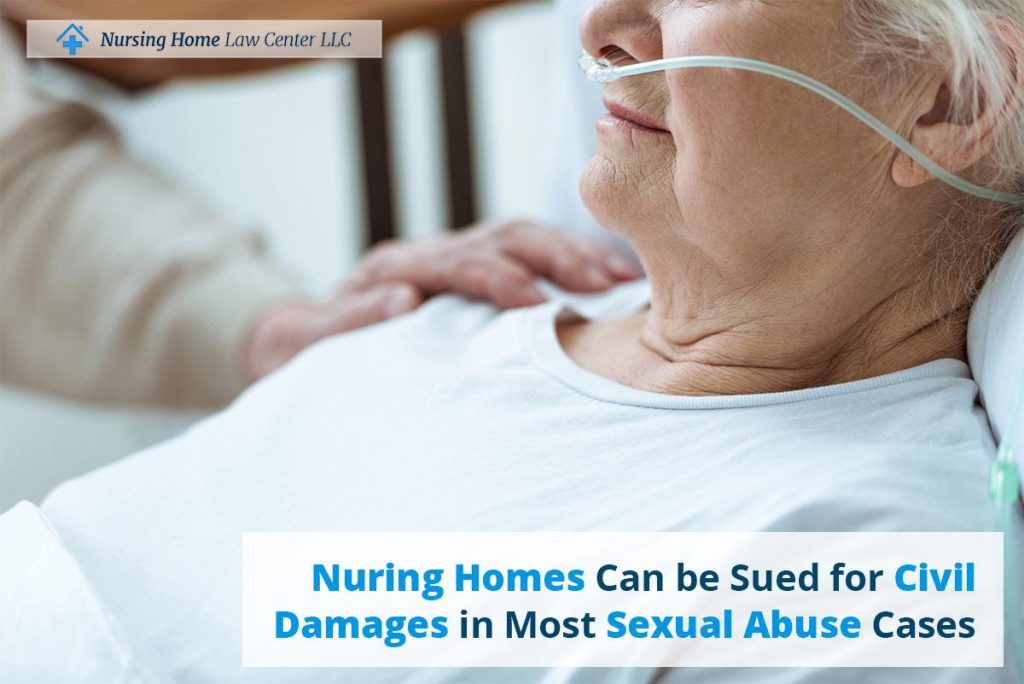
Why Choose Nursing Home Law Center
At Nursing Home Law Center, we have some of the top-rated nursing home sexual abuse attorneys in the country. Our legal team has recovered millions for victims and their families, earning national recognition for their work.
Our attorneys have been named as Super Lawyers and are part of the Million Dollar Advocates Forum. We focus solely on nursing home and assisted living facility cases, giving each client the focused attention and experience they deserve.
Types of Nursing Home Sexual Abuse Cases We Handle
Our top-rated attorneys handle a wide range of elderly sexual abuse cases.
The most common cases involve staff-on-resident abuse, especially during personal care tasks like bathing or dressing. We also handle cases involving resident-on-resident sexual assault, which are often ignored or downplayed by care facilities. Older adults with dementia or limited communication are especially vulnerable, and abusers frequently take advantage of their inability to report what happened.
Some cases involve third-party contractors, including janitors, transport staff, or outside aides with unsupervised access. Common forms of abuse include kissing, fondling, rape, coerced nudity, sexual assault, and sexual photography. No form of home sexual abuse should ever be dismissed or tolerated.
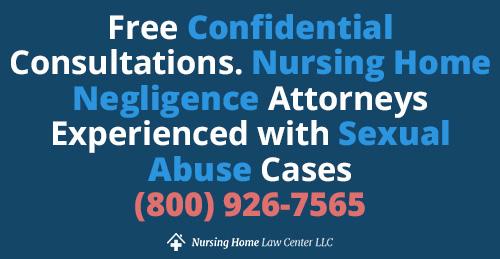
What Are the Most Common Causes of Sexual Abuse in Nursing Homes?
Sexual abuse in nursing homes often happens because of failures that could have been prevented. One major issue is the lack of proper background checks, allowing individuals with a history of misconduct to work with elderly individuals. Understaffing and poor supervision create conditions where abuse occurs without detection.
Many facilities also fail to provide proper staff training on resident boundaries and abuse prevention. Even worse, some ignore or downplay previous complaints, putting more residents at risk. In some cases, nursing home staff fail to separate vulnerable residents–such as those with dementia–from known aggressors, leading to further sexual assault or abuse.
What Are the Physical and Behavioral Signs of Elder Sexual Abuse?
Family members must remain vigilant, and any sudden change in behavior or unexplained injury should be taken seriously and investigated immediately.
Physical signs of sexual abuse may include bruising around the thighs or genitals, unexplained bleeding, pain when sitting or walking, or torn undergarments. Behavioral signs can involve sudden mood changes, fearfulness, withdrawal, anxiety, or signs of post-traumatic stress disorder.
How Common Is Sexual Abuse in Nursing Care Facilities?
According to a CNN investigation, more than 16,000 sexual abuse complaints have been reported in long-term care facilities since 2000. Between 2010 and 2015, 226 nursing homes were cited, yet just 16 lost federal funding–underscoring how often elder sexual abuse is overlooked.
A systematic review found that 12% to 23% of residents in aged care facilities were involved in resident-to-resident elder mistreatment, including sexual conflict.
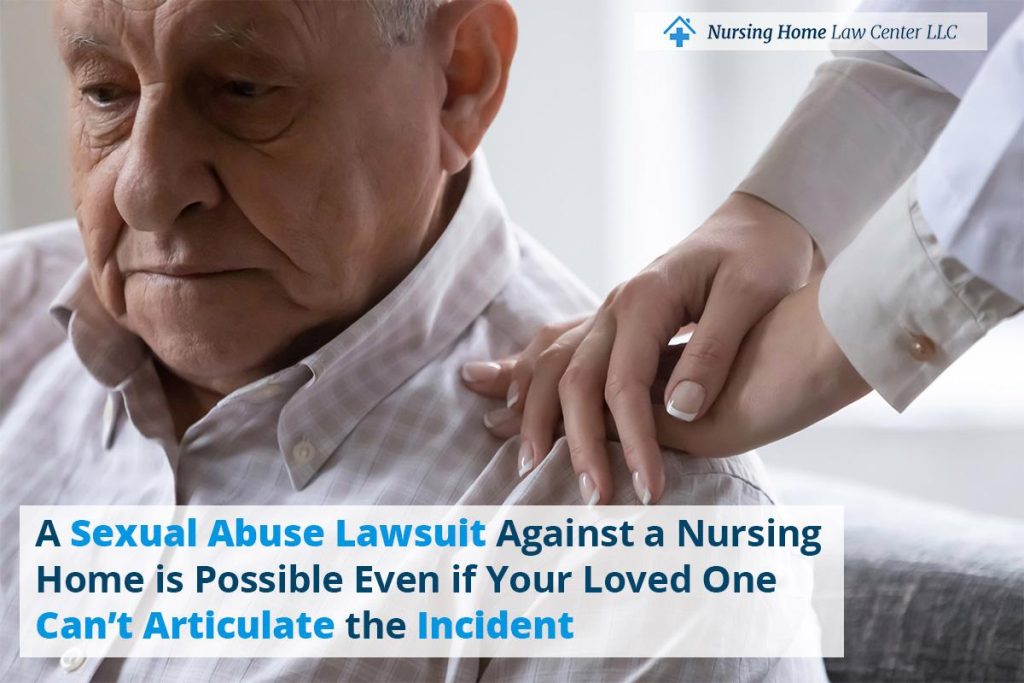
What Damages Can Elderly Victims of Sexual Abuse Recover?
Victims of sexual abuse in nursing homes may be entitled to recover a range of damages through a civil lawsuit.
Economic damages cover tangible costs such as medical expenses, therapy for PTSD, relocation to a safer care facility, or long-term care if the abuse causes lasting impairment.
Non-economic damages address the physical pain and deep psychological harm that often follow sexual abuse. These may include compensation for emotional distress, pain and suffering, and loss of dignity.
Courts may also award punitive damages to punish gross negligence or willful misconduct by staff members or facilities that failed to protect vulnerable residents.
What Is the Average Payout for Sexual Assault in a Nursing Home?
The average payout for sexual assault in a nursing home is approximately $854,666, with a value range between $50,000 and $2,014,000. The median award is $500,000, reflecting a wide variation depending on case specifics.
Why You Need a Nursing Home Sexual Assault Lawyer
Proving sexual abuse is rarely straightforward. Many victims suffer from dementia or communication challenges, making it difficult–or impossible–for them to testify. Nursing homes often deny wrongdoing or hide evidence, delaying investigations and putting other residents at risk.
A top-rated elder sexual abuse attorney understands how to gather critical proof, including expert witness testimony and detailed medical documentation. These cases often involve both civil claims and regulatory investigations, each with its own process.
Experienced legal representation is essential to hold responsible parties accountable and secure the compensation your loved one deserves after being sexually abused.
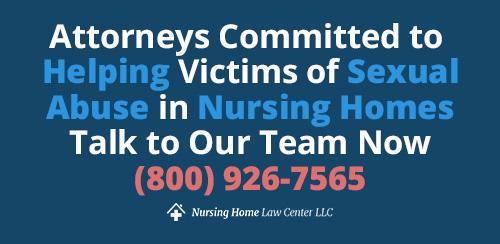
What Laws Govern Nursing Home Elder Sexual Abuse Claims?
The regulations below establish care standards, require abuse reporting, and provide enforcement mechanisms to hold facilities accountable.
- Nursing Home Reform Act (NHRA) of 1987 – Establishes minimum care standards for federally funded nursing homes, ensuring residents are free from abuse, neglect, and exploitation.
- Elder Justice Act (EJA) of 2010 – Requires mandatory reporting of abuse in long-term care facilities and imposes penalties for failure to report.
- Older Americans Act (OAA) – Funds Long-Term Care Ombudsman programs to investigate complaints and protect the rights and dignity of elderly residents.
- Federal Nursing Home Resident Bill of Rights – Guarantees residents of nursing homes the right to quality care, dignity, and the ability to file grievances without retaliation.
- Social Security Act – Section 1919 – Mandates state inspections of Medicaid/Medicare-funded nursing homes to enforce federal safety and care standards.
- Americans with Disabilities Act (ADA) – Prohibits discrimination against residents with disabilities and ensures equal access to care and facility accommodations.
- Civil Rights of Institutionalized Persons Act (CRIPA) – Grants the U.S. Department of Justice authority to investigate nursing home mistreatment and enforce legal protections for residents.
How Long Do Sexually Assaulted Victims Have to Take Legal Action?
The statute of limitations for filing a claim related to nursing home sexual abuse typically ranges from two to four years from the date of the abuse or the discovery of the abuse. However, there are nuances to the law that may affect how much time you have to file a sexual abuse claim.
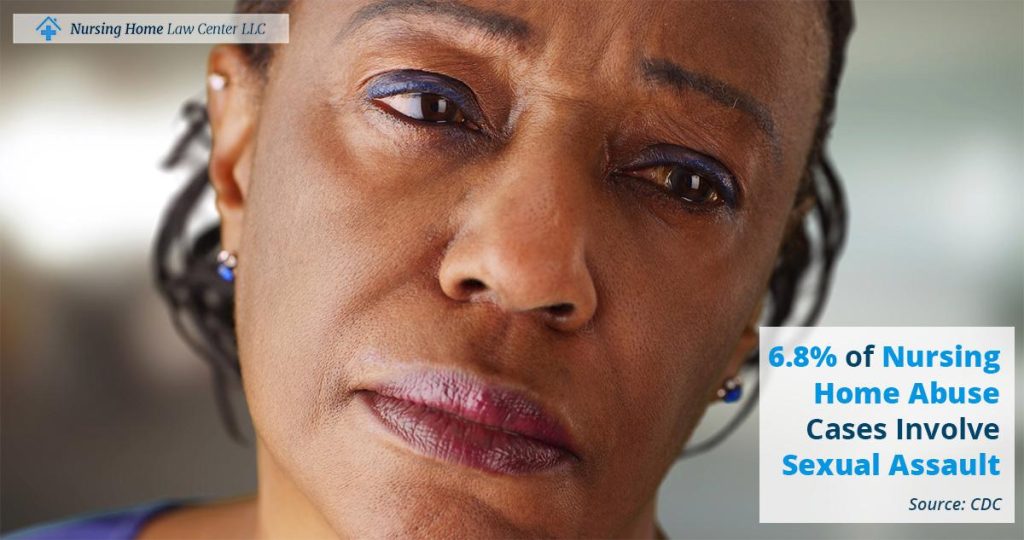
Who Is Legally Responsible for Sexual Abuse in a Care Facility?
In cases of elderly sexual abuse in nursing homes, multiple parties may be held liable. Facility operators and parent corporations can face liability for hiring unqualified staff, failing to perform background checks, or ignoring prior complaints. Individual staff members, including nurses or aides, may be directly responsible for the sexual assault.
Administrators and supervisors who failed to act on warning signs or reports can also be named in a lawsuit. In some cases, third-party caregivers, such as contracted aides or transportation providers, may be liable for abuse. An attorney can help identify all liable parties involved in the loved one’s abuse.
How to Strengthen Your Loved One’s Case
To strengthen your loved one’s case after suspected elder sexual abuse, quick and thorough action is essential. Most importantly, consider moving your loved one to a safer location. Document physical signs like bruising or bleeding and behavioral changes such as fearfulness, withdrawal, or mood swings. File a formal complaint with your state’s long-term care ombudsman or licensing agency.
Seek medical attention to assess for injury or signs of unwanted sexual contact. Request copies of facility records, staffing logs, and any surveillance footage. A nursing home sexual abuse attorney can help guide your next legal steps and preserve critical evidence.
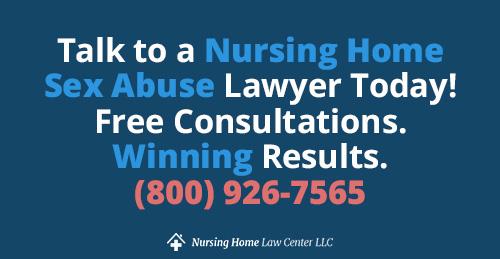
How to Report Elderly Sexual Abuse
If you suspect your loved one is experiencing sexual abuse, it’s essential to act quickly and report it to the appropriate agencies. Here are several options for reporting:
- National Adult Protective Services Association (NAPSA) – Report abuse through the National Adult Protective Services hotline or contact the local APS office in your state.
- National Center on Elder Abuse (NCEA) – Provides resources and state-specific reporting contacts.
- Local Law Enforcement – Report the abuse to the police or sheriff’s department. In cases of sexual assault, law enforcement may initiate a forensic investigation.
- Long-Term Care Ombudsman Program – Advocates for care home residents’ rights and investigates abuse reports. Find your state’s ombudsman at the National Consumer Voice for Quality Long-Term Care.
- U.S. Department of Health and Human Services (HHS) – Office for Civil Rights (OCR) – If abuse involves violations of federal rights or Medicare/Medicaid standards, file a complaint with HHS OCR.
- Nursing Home Corporate Office – If the facility is part of a larger chain, filing a report with the corporate compliance office may trigger an internal investigation.
How Our Nursing Home Abuse Attorneys Can Help
Our top nursing home abuse attorneys provide comprehensive support for families confronting sexual abuse in nursing facilities. We begin with an independent investigation, interviewing witnesses and reviewing evidence that the facility may try to conceal. Our team works with medical and psychological experts to document injuries and conditions like PTSD.
We obtain staffing records, hiring files, and prior state citations to show patterns of negligence. We also handle formal complaints with state regulators and long-term care ombudsmen. Finally, we pursue compensation through skillful settlement negotiations or by filing a lawsuit against all negligent parties.
FAQs
Who can file an elder sexual abuse lawsuit?
A lawsuit can be filed by the elderly victim if they are able, or by family members acting on their behalf when the victim has a cognitive decline or has passed away.
How much do elder abuse attorneys cost?
Our attorneys work on a contingency fee basis, meaning there are no upfront costs. We only collect a fee if they recover compensation through a settlement or verdict.
Who is most at-risk of sexual abuse in nursing homes?
Nursing home residents with dementia, Alzheimer’s, or limited communication abilities face the highest risk of being sexually abused. Older adults who are socially isolated or dependent on staff members for daily care are also more vulnerable.
Consult an Experienced Nursing Home Abuse Lawyer
If you suspect that someone you love has suffered from sexual abuse in nursing homes, you don’t have to face this difficult situation alone. At the Nursing Home Law Center, we understand the complexity and emotional strain of sexual abuse cases.
We are here to offer compassionate, expert guidance and will work tirelessly to ensure your loved one receives the justice they deserve. Use our online form or call (800) 926-7565 to explore your legal options during a free consultation.

